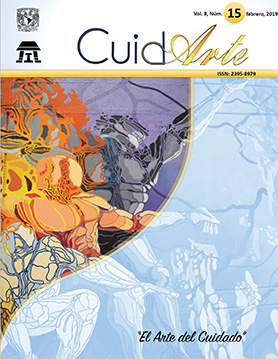Construction of the Professional Identity in the Students of the Degree in Nursing
Contenido principal del artículo
Resumen
Descargas
Detalles del artículo
Citas
(1) EvettsJ. Sociología de los grupos profesionales:historia,conceptosyteorías.Murcia;2003.pp:29-49.
(2) Samaniego V, Càrcamo S. La imagen e identidad profesional de enfermería. El devenir de una construcción. Investigación y educación en enfermería. Universidad de Antioquia. [Internet] 2013; 31 (1):54-62. Disponible en: https://bit.ly/2X0Ycd0
(3) Vanegas BC, Barrera G, Bautista LA, Gòmez NL, Hernàndez LJ, Ramìrez KJ, Roa VM. Construcción de la identidad profesional en estudiantes de enfermería de la universidad el bosque, 2007. Revista colombiana de enfermería [Internet] 2008;3 (3):33-43. Disponible en:https://bit.ly/2I9k8iG
(4) Rodriguez GG, Gil FJ, García JE. Metodología de la investigación cualitativa.España:Ediciones Aljibe;1996.115-120.
(5) Alvarez-Gayou, Jugerson J. Como hacer investigación cualitativa. Fundamentos y metodología. México: Edit. PaidosIbèrica; 2003.128-146.
(6) Diario Oficial de la Federación. Ley General de Salud. 2006. Disponible en:https://bit.ly/2Svtmu7
(7) Noreña AL, Alcaraz-Moreno N, Rojas JG, Rebolledo-Malpica D. Aplicabilidad de los criterios de rigor y ético en la investigación cualitativa. Aquichan [Internet] 2012; 12(3): 263-267. Disponible en:https://bit.ly/2r5uxDB
(8) Miles, M.B., Huberman A.M. Qualitative data analysis: Anex panded source book. Thousand Oaks,Ca.1994.2ªed.
(9) La importancia de la utoreconocimiento. [Consultado29julio2018]. Disponible en:https://bit.ly/2N9TEwp
(10) Álvaro GJ. Análisis del autoconcepto en relación con factores educativos, familiares, físicos y psicosociales en adolescentes [tesisdoctoral] Universidad de Granada. Facultad de ciencias de la educación. Granada,2015.
(11) Moreno AL, Pupuche BR, Ayala LR. Formación de la identidad profesional en los estudiantes de la facultad de Enfermería de una Universidad en Lambayeque (Perú). Revista Iberoamericana de educación e investigación en enfermería [En linea] 2012; 2(3):33-39. Disponible en:https://bit.ly/2WVnedv
(12) Damián J. Identidad profesional, reconocimiento social e inserción laboral del universitario con formación híbrida. Propósitos y Representaciones [Internet] 2014; 2(2): 9-76. Disponible en:https://bit.ly/2E60Nup
(13) Berger LP, Luckmann T. La construcciòn social de la realidad. Argentina: Editorial Amorrortooeditors; 2001.13-52.
(14) Tzeng HM, Ketefian S. Relación entre la satisfacción laboraly la satisfacción del hospitalizado: Un estudio exploratorio en un hospital de enseñanza enTaiwan. Journal of Nursing Care Quality [Internet]2002;16(2):39-49.
(15) Arreciado MA. Identidad Profesional Enfermera: Construcción y Desarrollo en los Estudiantes durantes u Formación Universitaria. Universidad de Barcelona. Barcelona.2013.
(16) Marina JA. Los secretos de la motivación. Barcelona: Ariel.2011.
(17) De Oliveira GJ, Medeiros GR, Nogueira VC, Santos CM, Gurgel CA, De Soza rego PD. Factores relacionados con la identidad profesional del enfermero: visión de los discentes. Enfermerìa global [Internet] 2013; 12(29):138-146. Disponible en:https://bit.ly/2mtTrsQ
(18) Cruz M, Trevilla CC. Influencia de la motivación intrínseca y extrínseca sobre la transmisión del conocimiento. Revista de economía pública,social y cooperativa[Internet]2009;1(66):187-211.Disponibleen:https://bit.ly/2BxgOIu
(19) Itayra PM. Tobe a nurse.A professional choice and the construction of identy processes in the 1979.Revista Brasileña de EnfermagemReben [Internet] 2016; 69(3):401-407. Disponible en:https://bit.ly/2SzWtwI
(20) Keeling J, Templeman J. An exploratory study: student nurses`perceptions of professionalism. Nurse education in practice. [Internet] 2012; 13(1): 18-22. Disponible en:https://bit.ly/2E8NzgR
(21) Aguayo GM. Construcción del rol profesional: significado otorgado por los alumnos a la relación con enfermeras clínicas durante lasprácticas clínicas. Universidad de Chile [Tesis Magister en educación], Chile,2005
(22) BanduraA.TeoríadelmodelajeAprendizaje-Cognitivo.España:Edit.Espasa Universitaria;1987.32-45.
(23) Albar JM, Sivianes FM. Percepción de la identidad profesional de enfermería en el alumnado de primero y cuarto del grado. Enfermería Clínica [Internet] 2015; 26(3): 194-198. Disponible en:https://bit.ly/2WZ89HL
(24) Nicolás SS. La narrativa en la construcción de la identidad profesional de la enfermera [tesis doctoral] UniversidadAutónomadelEstadodeHidalgo.Institutodecienciasyhumanidades. México.2007.
(25) Gómez BE, Caro AE, Gazabon CV, Ruz EE, Tuñon LD. Significado de Identidad Profesional, enEnfermeras(os) egresadosdelaUniversidaddeCartagena[TesisdeLicenciatura]. UniversidaddeCartagena.Bolivar. 2013
(26) ZapataMH. Enfermería ¿UnaProfesiónenCrisis? ElCasodelaCiudaddeMedellin-Colombia.Universidadde Antioquia. [Tesis de Magister en Salud] Medellin.2008

